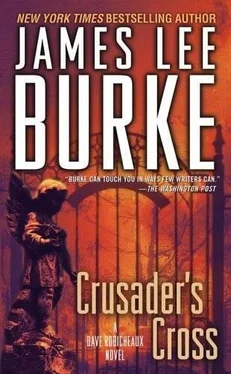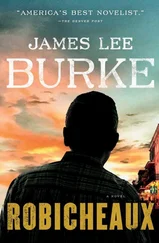"Is Ms. Coyne at home?" Jimmie asked.
"Si,"the gardener replied.
"Would you tell her Jimmie Robicheaux would like to speak to her?"
"Si," the gardener replied, staring into Jimmie's face.
"Would you go get her, please?"
"Si," the gardener replied, obviously not comprehending a word.
"Quien es?" a woman said from inside the fronds of a giant philodendron, where she was pulling weeds on her knees and dropping them in a bucket.
"My name is Jimmie Robicheaux, Ms. Coyne. I'm looking for an old friend and thought you might be able to help me," Jimmie said.
The woman stood up, brushing grains of dirt off a pair of cotton work gloves. She was slender, her hair a silvery-red. She wore a straw hat on the back of her head and a halter and Capri pants, and her shoulders were sprinkled with freckles. She walked to the gate, her eyes examining Jimmie's face.
"How can I help you, Mr. Robicheaux?" she said.
But the formality of her speech couldn't hide her regional inflection, nor disguise the fact she had correctly pronounced Jimmie's last name, after hearing it only once, which most people outside Louisiana are not able to do easily.
"Ida Durbin is the name of the lady I need to find," he said.
She looked at her watch and rubbed the glass with her thumb, more as an idle distraction from her own thoughts than as an effort to know the time.
"How's your friend, the private investigator?" she said.
"Clete Purcel? He's doing all right. I think he'd like to have a talk with your husband, though."
She stepped near the gate and closed her hand around one of the twisted iron spikes inside the grillework. "And yourself? You been doin' okay, Jimmie?"
"Life's a breeze. How's it with you, Ida?"
She reached into the bugle vine growing on the wall and pushed a button, buzzing the gate open. "Come on in, sailor, and let me tell you a story of hearts and flowers," she said.
On the morning they had planned to leave Galveston and start a new life in Mexico, Ida had asked Jimmie to drop her off at the bus depot so she could buy a few items downtown for the trip while he returned our Ford convertible to me and packed his clothes at the motel. She stored her suitcase in a coin locker, bought a pair of shoes and a kerchief and a small box of hard candy up the street, drank a lime Coke at a soda fountain, then retrieved her suitcase from the locker and took a seat in the whites-only section of the waiting room. The bus to Monterrey was due in twenty minutes.
Then she looked through the window and saw Lou Kale's '56 Bel Air pull to the curb, followed by an unmarked police car in which sat two plainclothes cops whom she recognized as regular visitors to the house on Post Office Street. Their names were Robert Cobb and Dale Bordelon. Both were rawboned men with cavernous eyes and square, callused-edged hands and mouths that did not smile, their hair mowed so closely into their scalps the ridges in their skulls glistened through the bristles. They followed Lou Kale into the waiting room, then approached Ida while Kale fished for change in front of a cigarette machine. Lou's lip was puffed, one eyebrow distorted by a knot, one nostril darker than the other from the beating Jimmie had given him.
"Take a walk outside with us, Missy," Cobb said, looking down at her from a great height.
"I'm waiting on my bus," she replied.
Cobb reached down and cupped her by the elbow. She felt herself rising to her feet, even though she had not been told she was under arrest or that she had violated any law. Her eyes swept the waiting room. The Negroes sitting in the section marked COLORED preoccupied themselves with their children or twisting about in their seats to watch the traffic on the street. The two clerks behind the ticket counter had suddenly discovered concerns of great import on printed fare and schedule sheets that moments earlier had seemed of little significance to them.
In her mind's eye she saw herself inside a single frame of a filmstrip that had suddenly frozen inside the projector. The sound was gone and all the figures were stationary, robbed of motion and breath, the selfishness of their ulterior motives in the script as stark as the grain in the film. Every figure in the frame, including herself, was complicit in a deed that the larger society would say could not occur. In this case, the deed was the abduction of an innocent person by law enforcement personnel in the middle of an American city, in full view of people who hid their eyes.
But the onus was on her, not them. She was a whore. She existed beyond the invisible boundaries of respectability and was not entitled to histrionic displays. To resist her abductors, who were also her users, was to make herself visible and to call into question the legitimacy of an entire system. As she rose from the bench, she could smell the detectives' armpits through their clothes.
She walked between the two men to their car, without either of them touching her person again. In the filmstrip that recommenced in her mind's eye, she saw herself as a gray, nondescript creature in the back of the car, disconnected from the rest of the world, the air tinged with the hot musty odor of the fabric in the seats. The detective named Cobb set her suitcase by her side and said, "It's gonna be all right, kid." For reassurance he grinned, his lips stretching back over teeth that were as long as a horse's.
As the car pulled away from the curb, with Lou Kale's Bel Air following close behind, she looked down the street and saw a canary-yellow convertible at the traffic light, with me behind the steering wheel and Jimmie in the passenger seat. Jimmie was tapping his hands on the dashboard to music she could not hear.
They drove her to a farmhouse, down in the Texas wetlands east of Beaumont. It was raining when they arrived, and through the bedroom window she could see acres of sawgrass and a flooded woods and, out in a bay, the gray outlines of mothballed U.S. Navy warships. The room was bare, except for a chipped chest of drawers and a bed that puffed with dust when she sat upon it. The sky was black now, and when lightning flared in the clouds she saw a solitary blue heron lift from the sawgrass and glide on extended wings toward the protection of the woods.
The man named Cobb was the first to take her. She kept her eyes shut and rested her hands lightly on the tips of his shoulders while he labored on top of her, his breath washing over her face. Inside her mind she watched the heron's flight across the points of the sawgrass, its wings flapping, its grace undisturbed by the storm raging in the sky.
The second detective, Dale Bordelon, tried to give her whiskey, then he brought her food that she wouldn't eat. When he placed his hand on her, a tremor went through her body. "Something you don't like about me?" he said.
"I'm sore," she replied.
"Whores don't get sore."
"I need to use the bathroom."
When she came back into the bedroom, he was already in his underwear and socks, smoking a cigarette on the side of the bed, tipping the ashes into the neck of an empty beer bottle. "Time's a-wasting, girl. Get them clothes off. I mean all off, too," he said.
"Where's Lou?" she asked.
"What d'you care about him? We're the best friends you got."
"I told you, Bob Cobb hurt me. I cain't do it anymore today."
He looked meanly into space, exhaling cigarette smoke from his nostrils. He hadn't shaved that morning and his jaws were like dirty sandpaper. "To heck with it," he said. Then he dressed and went out of the room, slamming the door behind him.
She curled up in a ball on the bed. When she awoke the sky was still dark, the clouds quaking with thunder, rain ticking in pools below the eaves. Lou Kale was sitting in a wood chair by the bed, leaning forward, his face gathered with a strange look of concern. A candle burned in a bottle on a nightstand someone had brought into the room. "Gonna give you a little bump, Connie. It'll hep you ride over the hard spots for a while," he said.
Читать дальше












